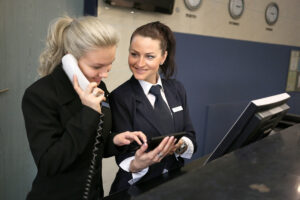How Can Hotels Use Technology to Improve Operational Efficiency
In today’s fast-paced world, technology plays a crucial role in every industry, including the Hotel Industry. As hotels strive to deliver exceptional guest experiences, it is essential for them to optimize their operational efficiency. By harnessing the power of technology, hotels can streamline their processes, enhance guest satisfaction, and gain a competitive edge in the market. Hotels are currently facing a major labor shortage, with 87% of hotels unable to fill open positions. Technology can help hotels to fill gaps caused by the shortage of workers. Below, we will explore the various ways in which hotels can utilize technology to improve their operational efficiency and elevate their overall performance.
1. Automated Check-In and Check-Out Systems
Traditionally, hotel guests had to go through lengthy check-in and check-out procedures, resulting in potential delays and inconvenience. However, with the advent of technology, hotels can now offer automated systems for check-in and check-out processes. This not only saves time for both guests and staff but also eliminates paperwork and reduces human errors. Guests can use self-service kiosks or mobile apps to complete these tasks efficiently, providing a seamless experience right from the beginning of their stay.
2. Advanced Reservation Systems
Hotels can greatly benefit from implementing advanced reservation systems. These systems allow guests to book rooms online, check availability in real-time, and even select specific preferences such as room type, amenities, and special requests. With the integration of secure payment gateways, guests can make hassle-free transactions, further enhancing the overall experience. Additionally, these systems enable hotels to manage their inventory effectively, optimize room utilization, and minimize the chances of overbooking or double bookings.
3. Smart Room Controls
Technology offers hotels the opportunity to provide guests with smart room controls, transforming their stay into a personalized and convenient experience. By incorporating Internet of Things (IoT) devices, hotels can enable guests to control various aspects of their room, such as temperature, lighting, curtains, and entertainment systems, through a single device or mobile app. This level of automation not only enhances guest comfort but also helps hotels conserve energy by optimizing resource usage when rooms are unoccupied.
4. Efficient Inventory and Housekeeping Management
Maintaining an organized inventory and ensuring efficient housekeeping operations are crucial for hotel operations. Technology solutions such as property management systems (PMS) can streamline these processes, providing real-time updates on room availability, inventory levels, and housekeeping tasks. PMS platforms can automate inventory management, alert staff about low stock levels, and generate reports for efficient procurement. Furthermore, digital task management systems can assign and track housekeeping tasks, ensuring timely and thorough room cleaning.
5. Personalized Guest Services
Delivering personalized guest services is key to enhancing guest satisfaction and loyalty. Hotels can leverage technology to gather and analyze guest data, enabling them to offer tailored recommendations, promotions, and amenities. By utilizing customer relationship management (CRM) systems, hotels can track guest preferences, previous stays, and feedback to create customized experiences. For example, they can provide personalized welcome messages, suggest nearby attractions based on guest interests, or offer exclusive discounts on amenities the guest has previously enjoyed.
6. Streamlined Communication Channels
Efficient communication is vital within a hotel environment, where coordination between various departments is essential. Technology tools like unified communication systems can facilitate seamless communication between staff members, ensuring effective collaboration and quick problem resolution. With features like instant messaging, voice calling, and video conferencing, employees can easily connect and share information, leading to improved productivity and enhanced guest service.
7. Data Analytics for Performance Insights
To make informed decisions and continuously improve operations, hotels can harness the power of data analytics. By analyzing various metrics such as occupancy rates, guest reviews, revenue per available room (RevPAR), and average daily rate (ADR), hotels can gain valuable insights into their performance. This data-driven approach allows them to identify trends, make strategic adjustments, and optimize their operational processes accordingly. With the help of business intelligence tools and data visualization platforms, hotels can monitor their performance in real-time and drive sustainable growth.
Revolutionize Operational Efficiency
The utilization of technology in the Hotel Industry is paramount to improving operational efficiency and enhancing guest experiences. Automated check-in and check-out systems, advanced reservation systems, smart room controls, efficient inventory and housekeeping management, personalized guest services, streamlined communication channels, and data analytics are just a few examples of how hotels can leverage technology to their advantage. By embracing these technological advancements, hotels can optimize their operations, increase guest satisfaction, and ultimately achieve a competitive advantage in the market. By automating certain processes, hotels can allow staff to focus on other areas and enable them to do more with less resources, while staying ahead of the curve and revolutionizing your hotel’s operational efficiency.

